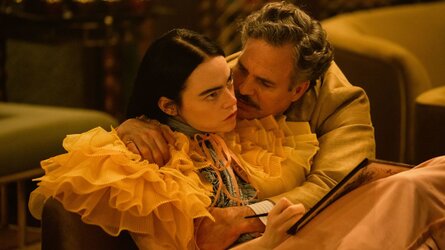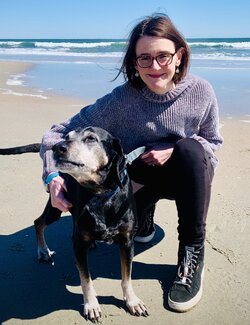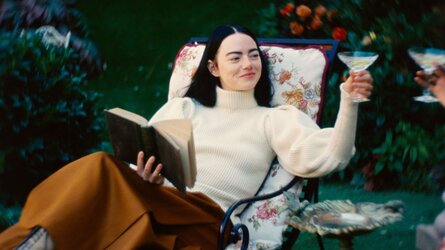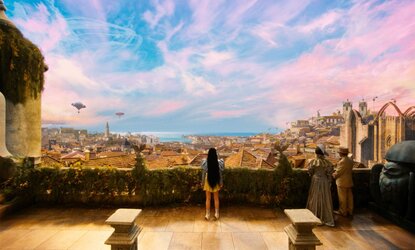Opinion by Sara Stewart
December 13, 2023

Emma Stone and Mark Ruffalo in the film 'Poor Things.'
Editor’s Note: Sara Stewart is a film and culture writer who lives in western Pennsylvania. The views expressed here are solely the author’s own. View more opinion articles on CNN.
In a year that’s seen one hit after another to women’s rights, “Poor Things” is a welcome, raunchy, hilarious escape. Yorgos Lanthimos’ steampunk dark comedy stars Emma Stone, who gives her best-ever performance as Bella Baxter, a mad scientist (Willem Dafoe)’s creation, who’s living entirely outside the confines of patriarchal morals.

Sexy Sara Stewart
The movie couldn’t be a more perfect end-of-year counterpart to the one that dominated a good chunk of this year, Greta Gerwig’s “Barbie.” (CNN and the distributor of “Barbie” share a parent company, Warner Brothers Discovery.) As much as I loved that near-perfect confection of a film, “Poor Things” dares to go places that “Barbie” didn’t or couldn’t (especially with Barbie manufacturer Mattel as a producer). Director Lanthimos (“The Lobster,” “The Favourite”) explores what it looks like when a woman exists in so-called polite society while giving zero f–ks. Figuratively, anyway.
The early, “Bride of Frankenstein”-esque chapter may admittedly be a little rough going for the squeamish viewer. Upon meeting her creator’s medical student, Bella smacks him in the nose and laughs with delight at the sight of blood. She joins Dafoe’s character in his laboratory and amuses herself by stabbing a corpse’s eyes with a scalpel (“squish, squish!”). But as her brain develops at “an accelerated rate” in this fantasy, she discovers masturbation, and a whole new world opens up.
Much of the press coverage and social media discussion of the film, beginning with its celebrated release at the 80th Venice International Film Festival this September, has revolved around all the sex: Bella, an entirely shame-free character, romps through Europe with a variety of men, chief among them Mark Ruffalo in a hilarious performance as Duncan Wedderburn, a slick yet dopey lawyer who’s good in bed.
Sure, some scenes are graphic — there’s full-frontal nudity and plenty of simulated sex. But what I find shocking is how much more attention this film’s amorous content gets than the rivers of blood and nonstop violence that make up so many other mainstream films (I have yet to see any movie critic complain about the nonstop gun violence in “John Wick,” for example).

Emma Stone stars as Bella Baxter, a mad scientist's creation, who’s living entirely outside the confines of patriarchal morals.
Stone herself has commented on this weird dichotomy, in a quote that sounds like something that might come from her “Poor Things” character in her later, more articulate phase: “The culture of America and its relationship to violence is really fascinating, that it would be so prudish around sexuality, something that’s a part of a natural human experience and the way that people literally are created and born—that’s shameful, for some reason, but the way they die is not,” she told The Atlantic.
Shame, and the lack of it, is at the heart of “Poor Things,” which, through its various titled chapters, follows Bella as she evolves from a carnal, monosyllabic, lurching Id into a voracious reader and budding socialist. (The film’s based on a 1992 novel by Alasdair Gray, whose anarchic spirit has apparently been somewhat toned down for the film.)
Bella is the total embodiment of a conservative nightmare: A woman who has absolutely no interest in, or requirement for, subscribing to traditional notions of what women can do and not do. It’s tragic that freedom from shame and patriarchy is such fantasy terrain, but it’s also a hoot to watch. Ruffalo’s character gnashes his teeth after learning Bella’s slept with someone else, and she looks at him, confused: “I had the heat that needed release. So at my request, it was,” she says with a shrug.
As her language skills improve, she finds her way to philosophy. “I’m reading Emerson,” she tells Duncan. “He speaks about the improvement of men. I do not know why he does not give advice to women. Perhaps he does not know any.” And when she tires of his jealousy, she blithely dismisses him en route to a socialist meeting: “We are our own means of production. Go away.”

Bella (Emma Stone) is a woman who has absolutely no interest in, or requirement for, subscribing to traditional notions of what women can do and not do.
One of the best sequences, set on a gloriously over-the-top cruise ship, reminded me of the “Barbie” bus stop scene. Bella and an older woman (German film icon Hanna Schygulla) take a liking to one another, and she introduces the senior to Duncan as “my new friend, who has not been f–ked in 20 years. Is that not astonishment?” Her advice to her older friend: “I hope you use your hand between your legs to keep yourself happy!”
You could view “Poor Things” as a feminist utopian riff on the Victorian picaresque novel, and era. If a real woman in the 1800s behaved this way, she would likely have been committed to an asylum, or a prison. But the darker truth is that women today, here in the US and globally, are still treated like property, still attacked and silenced for voicing the idea that they’re not second-class citizens or exerting their independence.
Last month, former First Lady Michelle Obama said to the BBC that “In the United States, we are dealing with a rollback in reproductive rights, things that people thought they could take for granted… that has been rolled back and a lot of it is because of the devaluation of women, the belief that women don’t have choice and power over their own being.” Women who stand up to angry, violent men are routinely killed for it. Recent global estimates from the UN Office on Drugs and Crime and UN Women show that, on average, more than five women or girls are killed every hour (or one every 11 minutes) by someone in their own family, Forbes reported last month. And, of course, we routinely hear about women being denigrated for being sexual or forgoing traditional gender expectations.
I don’t know about you, but one of my coping mechanisms in a world full of this much darkness is humor. And “Poor Things,” with its fantastically physical feminist creation, is comic balm for the soul and an artistic exhortation to better things. I’ll let Bella Baxter sum up: “It is only the way it is until we discover the new way it is, and then that is the way it is until we discover the new way it is, and so it goes, until the world is no longer flat.”


